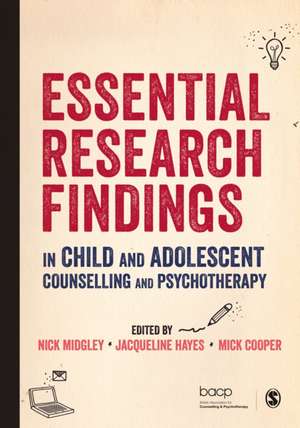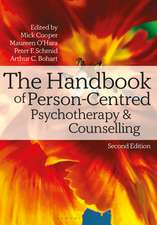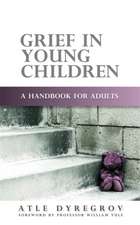Essential Research Findings in Child and Adolescent Counselling and Psychotherapy
Editat de Nick Midgley, Jacqueline Hayes Hayes, Mick Cooperen Limba Engleză Paperback – 26 feb 2017
This book provides the answers to these questions, and more. Leading experts in the field take you through the latest research findings in child and adolescent therapy, discussing how each is relevant to the work of practitioners. Today, both therapists and trainees need to be aware of, and engage with, research findings. The book presents, accessibly, the current best knowledge and its implications for practice.
| Toate formatele și edițiile | Preț | Express |
|---|---|---|
| Paperback (1) | 316.02 lei 3-5 săpt. | +22.21 lei 10-14 zile |
| SAGE Publications – 26 feb 2017 | 316.02 lei 3-5 săpt. | +22.21 lei 10-14 zile |
| Hardback (1) | 821.12 lei 6-8 săpt. | |
| SAGE Publications – 27 feb 2017 | 821.12 lei 6-8 săpt. |
Preț: 316.02 lei
Nou
Puncte Express: 474
Preț estimativ în valută:
60.48€ • 62.91$ • 49.93£
60.48€ • 62.91$ • 49.93£
Carte disponibilă
Livrare economică 22 martie-05 aprilie
Livrare express 11-15 martie pentru 32.20 lei
Preluare comenzi: 021 569.72.76
Specificații
ISBN-13: 9781412962506
ISBN-10: 1412962501
Pagini: 216
Dimensiuni: 170 x 242 x 16 mm
Greutate: 0.39 kg
Ediția:First Edition
Editura: SAGE Publications
Colecția Sage Publications Ltd
Locul publicării:London, United Kingdom
ISBN-10: 1412962501
Pagini: 216
Dimensiuni: 170 x 242 x 16 mm
Greutate: 0.39 kg
Ediția:First Edition
Editura: SAGE Publications
Colecția Sage Publications Ltd
Locul publicării:London, United Kingdom
Recenzii
This book is extremely well thought-out and is a must-have for those working with children and young people.
This book is the 'go-to' resource for all those involved in supporting young people.
This is a ground breaking book for counsellors and psychotherapists working with children and young people. The contributors acknowledge the scepticism of many practitioners in relation to adopting an “evidence based approach” and each chapter is likely to provoke debate and discussion. For me the power of this book lies in the way the authors employ their own self-reflexivity to model an approach to evidence-based practice, and suggest ways their readers might set about finding and examining evidence themselves. Through reading this work, each of us may, indeed, become “research-invigorated”.
Essential Research Findings in Child and Adolescent Counselling and Psychotherapy makes an invaluable contribution to research-informed practice with younger clients. Written by some of the leading figures in the field, it provides practitioners with an authoritative and accessible overview of up-to-date scientific knowledge.
With contributions from a range of experts, the text offers specific therapeutic guidance for working effectively with children and young people with mental health problems, drawing on the latest research evidence.
There are two strongly held narratives around today about what makes for a good counsellor or psychotherapist: the narrative of ‘clinical experience’ verses the narrative of ‘research evidence’. This book skillfully brings these two narratives together into a coherent and complementary whole. It provides an engaging overview of research in the field of children and young peoples psychological therapies written by some of the world leaders in the field. It is not a book about research but more helpfully, it is a book about how to understand and use research evidence, to blend with clinical experience, to become a better therapist. It is one of the most accessible and comprehensive summaries of the research evidence that I have read - essential for all who are serious about their therapeutic practice.
Essential Research Findings in Child and Adolescent Counselling and Psychotherapy is extremely important reading for child psychotherapists who are interested in the latest research, as well as for those who would like to be better informed but have tended to find the area of research daunting and arduous to digest. Rather than being purely about research, this book acts as a guide to understanding research evidence and how to use it to reflect on one's own practice to become a better therapist. I would strongly recommend this reading to all Child and Adolescent Psychotherapists
This is a practitioner-friendly text that arms counsellors with knowledge on how their ways of working are, or can be, underpinned by research findings.
I really enjoyed this book. I think it’s well written, informative and interesting. It will appeal to students and experienced practitioners alike – we all need to participate in applying research findings to our practice and in becoming, as the editors suggest, ‘research inspired’.
This book is the 'go-to' resource for all those involved in supporting young people.
This is a ground breaking book for counsellors and psychotherapists working with children and young people. The contributors acknowledge the scepticism of many practitioners in relation to adopting an “evidence based approach” and each chapter is likely to provoke debate and discussion. For me the power of this book lies in the way the authors employ their own self-reflexivity to model an approach to evidence-based practice, and suggest ways their readers might set about finding and examining evidence themselves. Through reading this work, each of us may, indeed, become “research-invigorated”.
Essential Research Findings in Child and Adolescent Counselling and Psychotherapy makes an invaluable contribution to research-informed practice with younger clients. Written by some of the leading figures in the field, it provides practitioners with an authoritative and accessible overview of up-to-date scientific knowledge.
With contributions from a range of experts, the text offers specific therapeutic guidance for working effectively with children and young people with mental health problems, drawing on the latest research evidence.
There are two strongly held narratives around today about what makes for a good counsellor or psychotherapist: the narrative of ‘clinical experience’ verses the narrative of ‘research evidence’. This book skillfully brings these two narratives together into a coherent and complementary whole. It provides an engaging overview of research in the field of children and young peoples psychological therapies written by some of the world leaders in the field. It is not a book about research but more helpfully, it is a book about how to understand and use research evidence, to blend with clinical experience, to become a better therapist. It is one of the most accessible and comprehensive summaries of the research evidence that I have read - essential for all who are serious about their therapeutic practice.
Essential Research Findings in Child and Adolescent Counselling and Psychotherapy is extremely important reading for child psychotherapists who are interested in the latest research, as well as for those who would like to be better informed but have tended to find the area of research daunting and arduous to digest. Rather than being purely about research, this book acts as a guide to understanding research evidence and how to use it to reflect on one's own practice to become a better therapist. I would strongly recommend this reading to all Child and Adolescent Psychotherapists
This is a practitioner-friendly text that arms counsellors with knowledge on how their ways of working are, or can be, underpinned by research findings.
I really enjoyed this book. I think it’s well written, informative and interesting. It will appeal to students and experienced practitioners alike – we all need to participate in applying research findings to our practice and in becoming, as the editors suggest, ‘research inspired’.
Cuprins
Introduction: What can child therapists learn from research? - Nick Midgley, Jacqueline Hayes and Mick Cooper
Epidemiology: Are mental health problems in children and young people really a big issue? - Ann Hagell and Barbara Maughan
Neurobiology, attachment and trauma: The development of mental health problems in children and young people - Graham Music
Therapy outcomes: Is child therapy effective? - Terry Hanley and Julia Noble
Therapy outcomes: What works for whom? - Peter Fonagy, Liz Allison and Alana Ryan
What leads to change? I. Common factors in child therapy - Jacqueline Hayes
What leads to change? II. Therapeutic techniques and practices with children and young people - Jacqueline Hayes and Clare Brunst
Conclusion - Nick Midgley, Jacqueline Hayes and Mick Cooper
Epidemiology: Are mental health problems in children and young people really a big issue? - Ann Hagell and Barbara Maughan
Neurobiology, attachment and trauma: The development of mental health problems in children and young people - Graham Music
Therapy outcomes: Is child therapy effective? - Terry Hanley and Julia Noble
Therapy outcomes: What works for whom? - Peter Fonagy, Liz Allison and Alana Ryan
What leads to change? I. Common factors in child therapy - Jacqueline Hayes
What leads to change? II. Therapeutic techniques and practices with children and young people - Jacqueline Hayes and Clare Brunst
Conclusion - Nick Midgley, Jacqueline Hayes and Mick Cooper
Descriere
A complete introduction to the latest research findings in child and adolescent counselling








